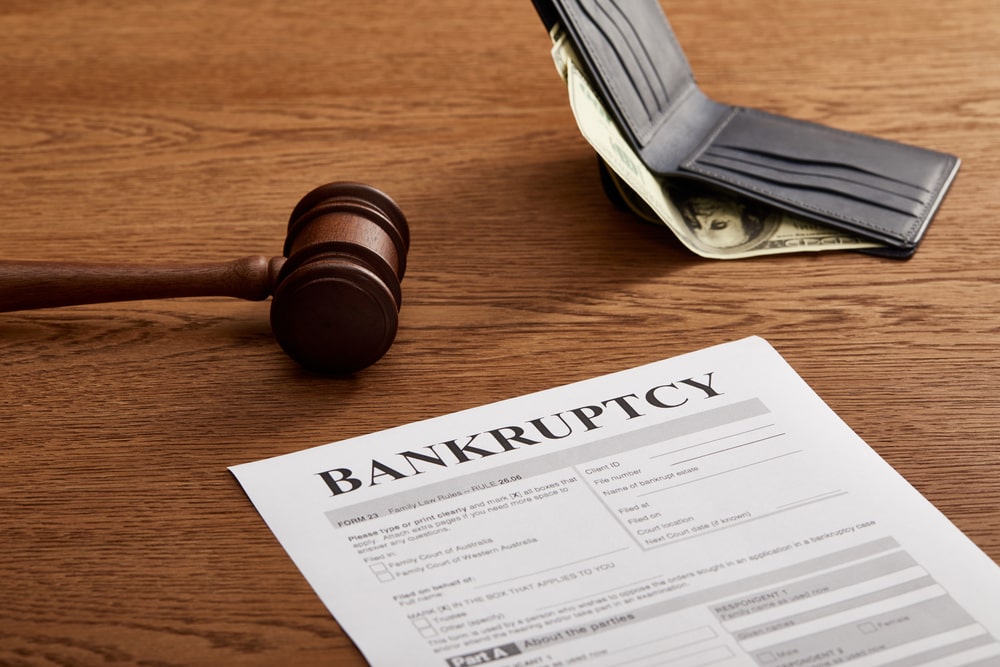 Bankruptcy Law Attorney Oklahoma City OK
Bankruptcy Law Attorney Oklahoma City OK
Deciding whether to file for bankruptcy is never easy. While many homeowners anticipate being able to pay their mortgage every month, sometimes unexpected things happen that can result in financial difficulty. A homeowner may wonder whether filing for bankruptcy could help prevent foreclosure. As soon as a notice of foreclosure is received, a homeowner may benefit from meeting with a bankruptcy law firm Oklahoma City, OK residents trust for guidance concerning their next steps. Risk of foreclosure should always be taken seriously, as the homeowner and their family may be at risk of having to relocate in the event a foreclosure action is finalized. Thankfully, the legal team at The Law Offices of Marty D. Martin has extensive experience with this issue and we’re here to help.
Does filing for bankruptcy always work in preventing foreclosure?
While filing for bankruptcy is a common way for homeowners to avoid foreclosure, this approach does not always work. There are instances where the foreclosure may continue regardless of a bankruptcy filing. For example, a homeowner who was approved to operate under Chapter 13 bankruptcy, but does not maintain monthly payments, may be at risk for losing their home. If a homeowner is approved to operate under Chapter 7 bankruptcy, the bank lender may request to the courts for a motion of relief from stay. If granted, the automatic stay will no longer be enforced for that debt and the foreclosure could continue. As a result, it is important to speak with an experienced Oklahoma City, OK bankruptcy law firm before making any assumptions about whether bankruptcy will work to halt foreclosure in your situation specifically.
What is the best way to figure out whether bankruptcy is right for my situation?
A homeowner may want to consult with an Oklahoma City, OK bankruptcy law firm that is experienced in representing clients facing foreclosure before applying for bankruptcy relief. An Oklahoma City, OK bankruptcy law firm can offer insight on which chapter may be most suitable, based on the homeowner’s individual circumstances.
Can applying for bankruptcy relief make the situation worse?
A homeowner may understandably react with panic after receiving the foreclosure notice and want to take action right away. But, it may make matters even worse if the homeowner files for a chapter of bankruptcy that is not in his or her best interest. This may result in sinking into an even deeper financial hardship.
The bankruptcy chapter that may work most favorably for the homeowner, will be based on a variety of factors. A homeowner who applies for Chapter 7 may find the process is much quicker than Chapter 13, but the bank may still be able to continue along with the foreclosure. It is important a homeowner understands that while an automatic stay is enforced, the bank can still get court approval to sell the foreclosed property even when the homeowner’s status is live under Chapter 7 bankruptcy.
Chapter 13 bankruptcy may be more fitting for a homeowner who is able to pay back a portion of their debts related to the loan. Under this chapter, the homeowner is likely to have to pay money into a repayment plan over the next three to fives years. If the homeowner is unable to maintain such payments under bankruptcy, then the foreclosure process may continue. Please consider contacting our Oklahoma City, OK bankruptcy law firm today so that we can advise you of your options and help you to protect your rights as a homeowner.
Is Filing Bankruptcy Right For Me?
Deciding whether bankruptcy is right for you depends on your financial situation, long-term goals, and other debt management options. Bankruptcy is a legal process that helps individuals or businesses eliminate or restructure their debt, offering a fresh financial start. While it can provide relief from overwhelming debt, it also has significant consequences. Consulting with an experienced Oklahoma City, OK, bankruptcy law firm can help protect your assets and guide you to the right choice.
Bankruptcy may be a good option if your debts are unmanageable, and you’re struggling to meet basic living expenses due to debt payments. It can stop collection efforts, prevent foreclosure, and eliminate unsecured debts like credit card debt and medical bills. However, some debts, like student loans, child support, and recent tax debts, are typically not discharged in bankruptcy.
There are different types of bankruptcy, such as Chapter 7, which discharges many debts but may require liquidating assets, and Chapter 13, which involves creating a repayment plan to pay off debts over time. Both have distinct eligibility requirements and implications for your assets and credit score.
Before filing, consider speaking with a financial advisor or attorney to explore all options. Alternatives like debt consolidation or a negotiated repayment plan may help without the long-term impact on your credit. Bankruptcy can provide relief, but it’s essential to weigh the pros and cons based on your specific situation.
Which Type Of Bankruptcy Is Right For Me?
Determining the right type of bankruptcy depends on your financial situation, income, and long-term goals. The two most common forms of bankruptcy for individuals are Chapter 7 and Chapter 13. Each has unique benefits, eligibility requirements, and impacts on your assets and future financial life.
Chapter 7 bankruptcy is often referred to as “liquidation bankruptcy.” It’s typically suited for individuals with low income and few assets. In Chapter 7, most unsecured debts—like credit card debt, personal loans, and medical bills—are discharged, meaning you no longer have to repay them. However, some assets may be sold to repay creditors. Each state allows certain “exemptions,” so many people can keep essential assets like a car or primary residence (up to a certain value). Chapter 7 usually takes a few months to complete, but it significantly impacts your credit score, remaining on your credit report for 10 years.
Chapter 13 bankruptcy is often called a “reorganization” or “wage earner’s” plan. It’s designed for individuals with regular income who want to keep their assets. In Chapter 13, you create a repayment plan to pay off part or all of your debt over 3 to 5 years. This can be a good option if you’re behind on mortgage or car payments, as it allows you to catch up and avoid foreclosure or repossession. However, it requires that you have a reliable income to stick to the payment plan. Chapter 13 remains on your credit report for 7 years but can be less damaging over time since you repay some debts.
Choosing between Chapter 7 and Chapter 13 depends on factors like income, type of debt, and asset value. Consulting a bankruptcy attorney or financial counselor can help clarify your options and assess which chapter aligns best with your situation. Other options like debt consolidation or settlement might also be worth considering before filing for bankruptcy.
If you’re still unsure which version is right for you, contact a reliable Oklahoma City bankruptcy law firm for a personalized solution.
What To Expect During The Bankruptcy Process
Filing for bankruptcy can feel overwhelming, but understanding what happens during the process can make it easier to manage. Whether you’re filing for Chapter 7 or Chapter 13, there are several key steps you’ll encounter along the way. Here’s what you can expect during the bankruptcy process.
Consulting With A Lawyer
The first step is meeting with a bankruptcy attorney to discuss your financial situation and determine the best type of bankruptcy for your needs. At this stage, we’ll review your income, debts, assets, and financial goals. Choosing an experienced Oklahoma City bankruptcy law firm, like Marty Martin Bankruptcy Law, can make a big difference in preparing for the process.
Filing The Bankruptcy Petition
Once you’ve decided to move forward, the next step is filing your bankruptcy petition with the court. This document includes detailed information about your financial situation, such as your income, expenses, debts, and assets. It’s essential to be thorough and accurate in this filing to avoid delays or complications.
Automatic Stay Goes Into Effect
As soon as your petition is filed, an automatic stay is triggered. This means creditors must stop all collection activities, including phone calls, wage garnishments, and lawsuits. This provides immediate relief from the pressure of debt collection while your case is being processed.
Meeting With The Trustee
After filing, you’ll attend a meeting of creditors, often referred to as the 341 meeting. During this meeting, a court-appointed trustee will review your case and ask questions about your finances. While creditors are allowed to attend, they rarely do. This step helps the trustee verify the accuracy of your petition.
Reviewing Your Options For Asset Management
If you’re filing for Chapter 7, the trustee may liquidate certain non-exempt assets to pay creditors. For Chapter 13, you’ll work with your lawyer to create a repayment plan that lasts three to five years. Either way, this step focuses on how your debts will be handled moving forward.
Completing A Financial Education Course
Before your bankruptcy can be finalized, you’ll need to complete a financial education course from an approved provider. This course is designed to help you develop skills for managing your finances after bankruptcy and is a required step in the process.
Discharge Of Debts
Once all requirements are met, eligible debts will be discharged. This means you’re no longer legally obligated to pay them. For Chapter 7 cases, the discharge usually occurs within a few months of filing. In Chapter 13 cases, the discharge happens after the repayment plan is completed.
Rebuilding Financial Stability
After bankruptcy, you can start working on rebuilding your financial health. This may include creating a budget, monitoring your credit, and exploring ways to improve your financial habits. Bankruptcy provides a fresh start, and many clients find this stage empowering.
If you’re considering bankruptcy, Marty Martin Bankruptcy Law is here to help. As a trusted Oklahoma City bankruptcy law firm, we’re committed to guiding you through the process with clarity and confidence. Contact us today for a consultation and take the first step toward financial relief.
Bankruptcy FAQs
If you’re considering filing for bankruptcy in Oklahoma City, it’s natural to have many questions about the process, costs, and how it will affect your financial future. With over 20 years experience in bankruptcy and foreclosure law, our legal team addresses some of the common questions about hiring a bankruptcy law firm and the bankruptcy process itself.
What Are Reasonable Costs In Bankruptcy?
The costs of filing for bankruptcy can vary depending on the type of bankruptcy you file and the circumstances of your case. When filing for bankruptcy, there are several costs to consider. The filing fee for Chapter 7 bankruptcy is around $338, while Chapter 13 filing fees are slightly lower at approximately $313. Attorney fees vary depending on the type of bankruptcy, with Chapter 7 typically costing between $1,000 and $2,500, and Chapter 13 fees ranging from $2,500 to $4,000 due to the structure of the repayment plan. Additionally, there are costs for credit counseling and debtor education courses, which usually range from $50 to $100 each, as well as any applicable miscellaneous court fees.
How Do You Pay A Bankruptcy Lawyer If You Have No Money?
If you’re struggling financially, paying our bankruptcy lawyer can seem challenging, but there are options available. Some bankruptcy law firms offer flexible payment arrangements, including payment plans. Many attorneys will allow you to pay in installments before filing your case, making it more affordable.
If you qualify for Chapter 13, you may be able to include our attorney’s fees as part of your repayment plan, which means the payments are spread out over 3 to 5 years. In some cases, law firms offer reduced fees for individuals who cannot afford full payment, or they may offer pro bono services for qualifying clients.
It’s always a good idea to discuss your financial situation upfront. Marty Martin Bankruptcy Law offers free quotes and consultations for all of our legal services.
Will Bankruptcy Stop Collection Calls And Wage Garnishment?
Yes, filing for bankruptcy triggers an automatic stay, which immediately halts all collection efforts. This includes stopping:
- Collection calls from creditors
- Wage garnishment
- Lawsuits filed by creditors
- Repossession of your property
- Foreclosure proceedings
The automatic stay offers immediate relief while your bankruptcy case is being processed, giving you breathing room to work through your financial challenges.
What Are The Costs Associated With Hiring A Bankruptcy Law Firm In Oklahoma City?
The costs of hiring our Oklahoma City bankruptcy lawyer can vary based on the type of bankruptcy you file and the law firm you choose. In Chapter 7 Bankruptcy cases attorneys usually charge between $1,000 and $2,500, depending on the circumstances of your case. Fees range from $2,500 to $4,000 for Chapter 13 Bankruptcy as these cases require a repayment plan and more ongoing attorney involvement. Our law firm offers free initial consultations and quotes.
It’s important to discuss the full breakdown of costs during your initial consultation to understand how the fees will work for your specific case. Many Oklahoma City bankruptcy lawyers offer flexible payment options to accommodate clients in financial distress
How Long Does The Bankruptcy Process Take In Oklahoma City?
The timeline for filing bankruptcy in Oklahoma City depends on the type of bankruptcy you file:
- Chapter 7 Bankruptcy: The process typically takes 3 to 6 months from start to finish. After filing, you’ll attend a 341 meeting of creditors, and if everything goes smoothly, your debts can be discharged relatively quickly.
- Chapter 13 Bankruptcy: This type of bankruptcy involves creating a repayment plan to pay off a portion of your debts over 3 to 5 years. The entire process can take anywhere from 3 to 5 years, depending on how long your repayment plan lasts.
Our bankruptcy lawyer will provide you with a more accurate timeline based on the specifics of your case and make sure that all steps are taken efficiently.
Taking The First Step Toward Financial Relief
If you’re considering bankruptcy in Oklahoma City, understanding the costs, process, and how it can benefit you is vital. Our bankruptcy law firm can guide you through the steps, help you regain control over your finances, and work with you to find the best solution. Whether you’re facing collection calls and wage garnishments, or are struggling to pay off debt, our skilled bankruptcy attorney can help you make an informed decision that aligns with your financial needs. Call today to schedule a free case evaluation and take the first step toward financial relief.


